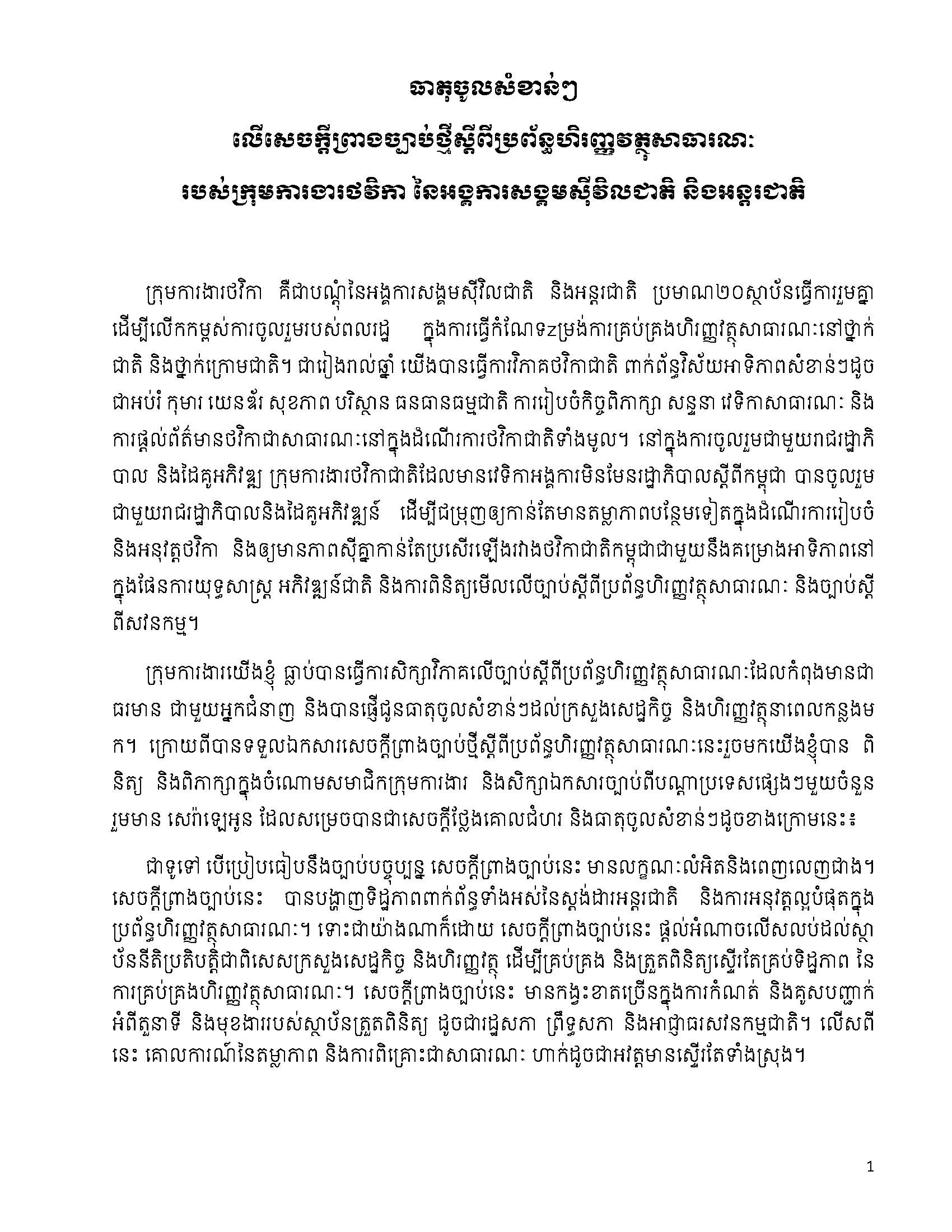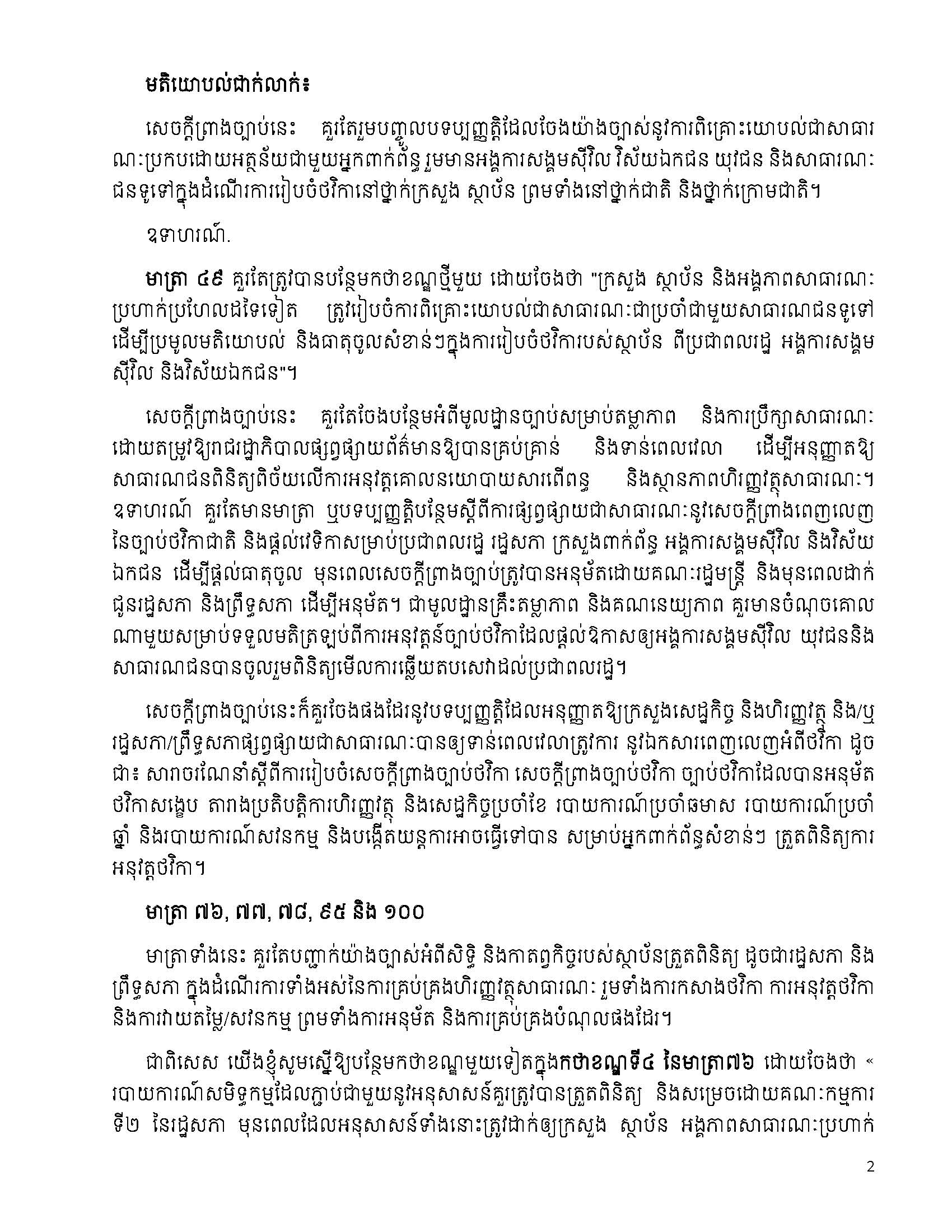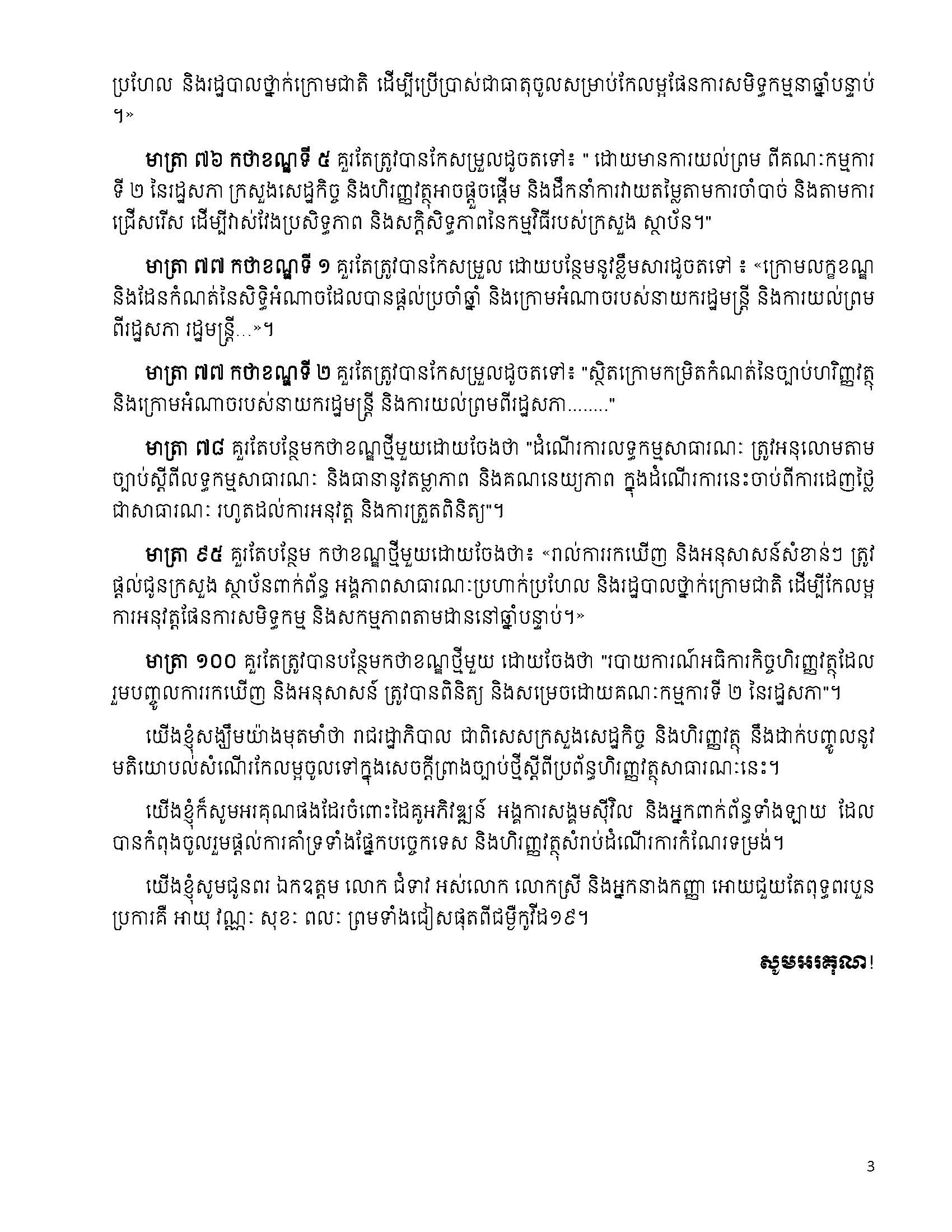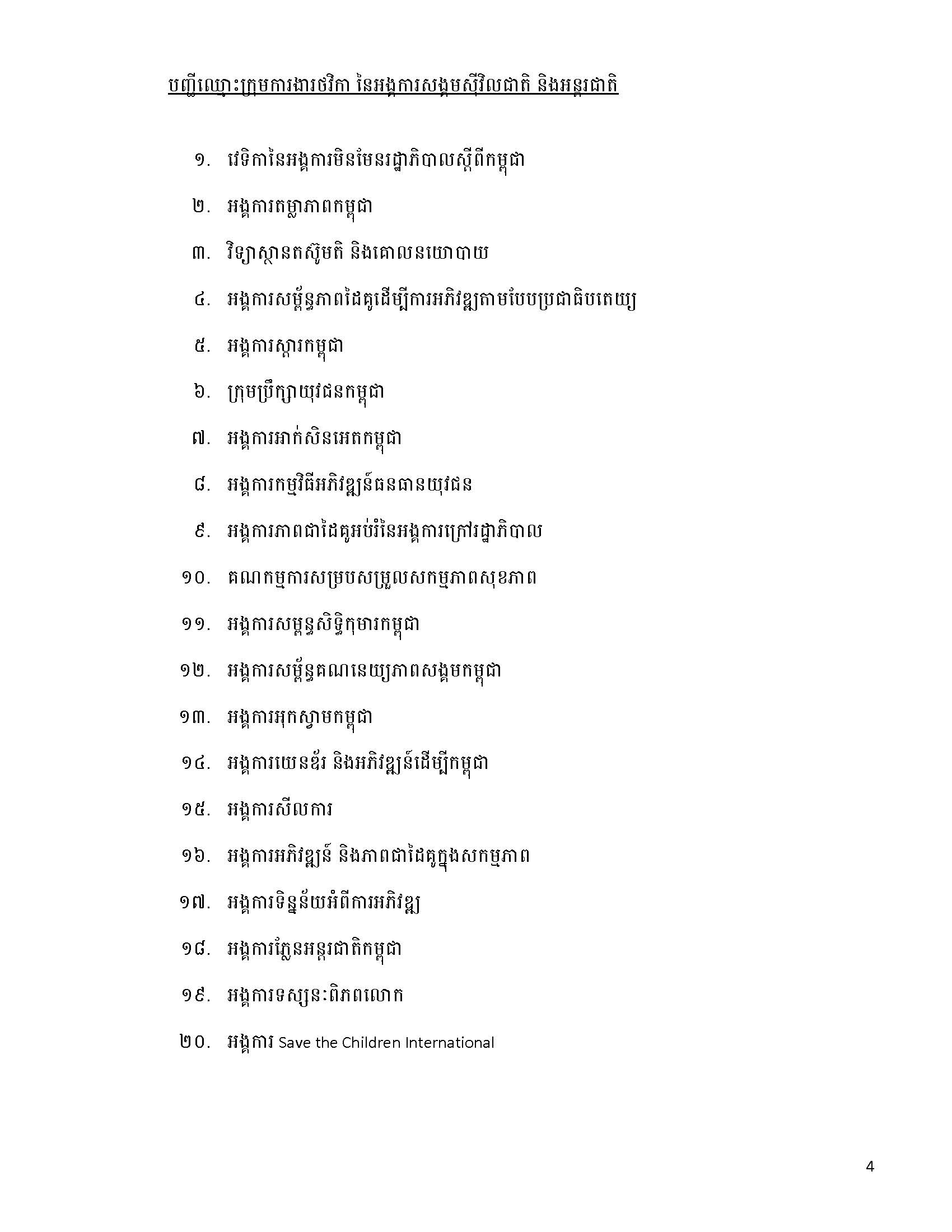Public Statement and Recommendations from the CSO on draLaw of Public Finance System




5




5
| Description |
|---|
Enhancing Institutional and Operational Capacities of the Provincial Associations of Local Councils (2019-2021) |
|
This EU funded project focuses on strengthening the capacity of the Provincial Associations of Local Councillors (PALCs) and their members, by promoting accountability, transparency and responsiveness to the demands of citizens and the needs of vulnerable groups. With a total budget of almost 450,000 euro and six target provinces, it is one of API’s bigger projects, and we implement it in a joint venture with the Provincial Association of Local Councillors in Pursat and Aide Et Action International (AEA). You can find detailed information about this endeavour here, read our latest report, watch our project videos or follow the media coverage of this initiative. |
Citizens’ Voices and Actions for Sustainable Development in Cambodia (2019-2022) |
|
Benefiting from the generous support of DanChurchAid (DCA) and Bread for the World to the tune of almost 600,000 dollars, this ambitious endeavour has the overall objective of fulfilling the rights and enhancing the voices of citizens, in an effort to make the country's development more sustainable. On the one hand, we want to actively engage right holders, especially women, youth, people with disability, low income citizens and their community based organisations (CBOs), encouraging them to get involved in the processes of public planning and budgeting at the district level. The latter has been playing a much bigger role since 2020. Citizens and CBOs should hold authorities accountable for service delivery and budget implementation. On the other hand, we would like to see an improvement in the citizens’ access to public information, especially when it comes to public budgets. We are pursuing activities related to this project in nine provinces. You can read our latest report, watch our project videos, or dive into the details following this link. |
Voices and Actions of People with Disabilities in Social Accountability (2019-2021) |
|
For API, inclusion is essential, especially when it comes to the issue of participation in local decision making processes. The main goal of this project is therefore to amplify the voices of persons with disabilities. This will provide them both the opportunity to make themselves heard, and an enhanced access to more equitable, quality public services. The target district is Tramkak in the Takeo Province, and the funding, around 150,000 dollars, is provided by the Dutch Foreign Ministry’s Voice grant facility, managed by Oxfam in Cambodia. Our partner in this initiative is Epic Arts. You can read more about this flagship project here. You can also download our latest report, watch our project videos, dive into the materials we produced for our National Conference on Social Accountability at the beginning of 2020, or learn more about inclusion in I-SAF by watching our training series dedicated to this topic. |
One Window for Citizens (2019-2022) |
|
API is implementing this civic tech undertaking in a consortium with Nickol Global Solutions (NGS) and InSTEDD, our budget share being 460,000 dollars, financed by the USAID. The aim is to design and deploy technical innovations in order to stimulate citizen engagement, comprehension and awareness of, as well as demand for quality in the public services offered by the One Window Service Offices under the authority of the district and provincial administrations. We focus on the provinces of Battambang, Kampong Chhnang and Banteay Meanchey in an effort to increase accountability. You can find out more details about this here and read our latest report here. |
Supporting Meaningful Civic Engagement for Improved Accountability by Leveraging Digital Technologies (2019-2023) |
|
In a similar vein, API has joined a partnership with CARE Cambodia and InSTEDD in order to enhance citizens’ participation through innovative tech solutions. The EU granted API 425,000 euro for this endeavour, which is part of Implementing the Social Accountability Framework (I-SAF), a broad reform agenda assumed by the Government, and supported by development partners and civil society. While our overall objective is to develop effective, accountable and transparent institutions and ensure public access to information, we are specifically concentrating on empowering young women belonging to indigenous minority groups, as well as on building the capacity of the Community Accountability Facilitators (CAFs) in four provinces. The project produced lots of results in 2022 despite, the COVID-19 challenges. The consortium partners carried out information for citizens (I4C) awareness raising activities, reaching over 30,000 citizens to improve citizens ' understanding of their rights, standards and performance as well as budget information on communes, schools, and health centre services. The citizen monitoring activities achieved to organise 96% of the 1,086 planned community scorecards and service provider self-assessment meetings despite the disruption of the commune election in early June 2022. The joint accountability action plans (JAAP) implemented 78% of the 1,926 actions planned in 2022. As a result of the above activities, the target community gained enhanced knowledge on rights, the standards, and duties of elected commune councils. They gained confidence to give feedback and ask questions to local authorities about commune, school, and health centre activities. The key target groups – in particular youth, women and ethnic minorities –, demonstrated behavioural changes, such as an increased use of health centre services during pregnancy, motivating their children to attend school and registering birth certificates at the commune office. The scorecard provided insight into the improvement criteria of standards and performance of public services raised by citizens. The service providers took responsive action to improve soft-skills and small-scale infrastructure, including women’s toilets, ramps for people with disability, and office materials and equipment that enhance service delivery. The digitised community scorecard application (DCSC App) was improved for easier use and to address software bugs. Input for ideas was sought from 70% of participants (8,634 people, 62% women). The newly designed workplan to strengthen the capacity of Community Accountability Facilitators (CAFs) was developed and implemented. For the new 2023 fiscal year, 100% of JAAP were developed in 181 planned communes. Advocacy and Policy Institute (API), Innovative Support to Emergencies Diseases and Disasters (InSTEDD) and CARE International in Cambodia with the local partners: |
Citizens’ Voices and Actions in Social Accountability (2019-2021) |
|
Also as part of Implementing the Social Accountability Framework (I-SAF) and as a first, API and Oxfam brought the idea of social accountability to Phnom Penh, more specifically to the administrative unit of Khan Sen Sok, insisting that local authorities and service providers such as primary schools and health centres need to be responsive to the citizens’ feedback and demands. We are also exploring how social accountability can be expanded to social protection services like the application process for equity cards that entitle low income and otherwise disadvantaged citizens to free of charge health services. The public should know what the service standards and the costs of these services are, and should be able to provide opinions and influence changes. In 2019 and 2020, Oxfam Cambodia has supported this piloting effort with 50,000 dollars per year. Watch the videos of some of our project activities here, learn more from our informative animations here, or read our latest report here. |
Enhancing Local Democratic Governance in Cambodia (2018-2020) |
|
This project set out to strengthen local governance and social accountability in four communes of the Kampong Thom and Banteay Meanchey provinces. It was funded by UNDEF with a total budget of 150,000 dollars. To achieve our goals, we focused on citizens’ participation in monitoring service delivery by local authorities, and we benchmarked this by two citizen scorecard surveys. The first served as the baseline, expressing citizens’ needs and demands, while the end survey evaluated the results achieved. The scorecard findings can be read here. API worked with three implementing partners, the Cambodian Organisation for Women Support (COWS) in Kampong Thom, the Village Support Group (VSG) in Banteay Meanchey, while the Coalition for Partnership in Sub-National Democratic Development (CPDD) disseminated the results in a national conference on social accountability in February 2020. You can read our last project report here. |
Change the Game Academy for Local Resource Mobilisation Capacity in Cambodia (2019-2021) |
|
Our objective here is to secure the resources civil society organisations can rely on in order to sustain their operations in Cambodia by building their organisational and leadership capacity of local resource mobilisation and mobilising support/advocacy. The funding for these measures, over 90,000 euro, is coming from the Wilde Ganzen Foundation in the Netherlands, API being one of the national partners in the implementation. The other partner is the Cooperation Committee for Cambodia (CCC), and, together, we are striving to make sure this learning programme meets international standards, while addressing the concrete needs of the local participants. You can experience more about this project here, read our latest report, and watch some of our videos. You can also book our courses here. |
Strengthening Youth Participation in Local Planning and Budgeting (2019-2021) |
|
We insist on improving the quality of social services offered by local authorities, and one way to do this is to encourage young people to participate in the planning and budgeting processes. This initiative is funded by UNICEF, with almost 130,000 dollars. The target districts are in Phnom Penh, Kandal and Kratie. You can read our latest project report and watch a TV talk-show about it here. |
Youths Debate the Development of the Cambodian Access to Information Law (2019-2020) |
|
Here, the objective was to create a new dynamic in a push for the Government and the Parliament to discuss, improve and pass the Cambodian access to information law. Our method of choice was inviting youth from all provinces to Phnom Penh, and have them debate about this topic. Although the law was not passed in 2020, the draft has been greatly improved due to our advocacy efforts. The project benefited from the support of the Swiss Development Cooperation Agency (SDC), DanChurchAid (DCA) and Bread for the World, to a total of 80,000 dollars. You can consult our last report, listen to the debates or watch our project video here. |
Voices and Actions of Young Women Leaders and Entrepreneurs (2019-2021) |
|
Under Pact Cambodia’s WE Act project, API has joined forces with the Independent Democracy of Informal Economy Association (IDEA), which is an association currently representing hundreds of informal street and market vendors in Phnom Penh, of whom 95% are women. Together, we are trying to strengthen their capacity to mobilise support and engage in advocacy, based on API’s facilitation expertise. Our key target group here are 20 local young women leaders who are learning to negotiate for their and their groups of market and street vendors’ concerns. Ten further participants from other women’s micro-entrepreneur networks and/or youth leaders have been invited to join API’s applied advocacy capacity development programme. This initiative is funded by USAID, the total budget being around 35,000 dollars. After 2020, in the context of the growing social problems caused by the Covid pandemic, the project is focusing increasingly on the issue of social protection. You can read our latest report here. |
Innovations for Social Accountability in Cambodia (2020-2023) |
|
Ta Khmao, the capital of the province of Kandal, has not had a lot of experience with implementing social accountability related initiatives yet. Therefore, this API project funded by the USAID through Family Health International (FHI360) is undertaking various activities aimed at helping citizens improve their capacity of requesting public information, networking for collective action, and developing solutions to the problems facing the local community. Using modern tech solutions, API will thus enable residents to score the performance of public service providers and actively participate in developing and implementing joint accountability action plans with representatives of local authorities. The total budget of the initiative is 380,000 US dollars. Read our latest report here or watch our informative animation. |
Access for All (A4A): Promoting Access to Information in Cambodia (2020-2021) |
|
In this endeavour which benefits from funding through a grant offered by the US Department of State, we are focusing on increasing the availability of public information in indigenous communities, especially among indigenous women. Recent studies have shown that, in Cambodia, women from vulnerable groups often do not have the necessary means to exercise and defend their rights in case of disputes or even in everyday life situations. Limited access to education, but also limited access to public information are definitely the main causes of a state of affairs where influential private entities are taking advantage of indigenous women groups, while state officials do not always treat them as equal to any other Cambodian citizen. Collective property rights and land concessions are undoubtedly one of the main issues here, yet the underlying problem is more general. Therefore, together with our partners from the East-West Management Institute (EWMI), we are focusing on building capacity in these communities, by offering tailor-made training courses covering topics such as grassroots advocacy, requesting information from public authorities or budget control skills. At the same time, we are working on a dedicated online learning platform, as well as on two tracking tools meant to help indigenous women monitor the legal compliance of land concessions and the public spending by district administrations. The project is being implemented in three provinces, with a total budget of almost 200,000 US dollars. You can read our annual project report here and watch our documentary video series by clicking on this link. |
Promoting Rights, Voices, Choices and Decisions for Citizens (Pro-Citizens, 2016-2019) |
|
|
Implementation of the Social Accountability Framework (I-SAF, 2016-2018) |
|
|
Promoting good governance by increasing access to information and strengthening the independent media (2015-2018) |
|
|
Working Towards an Access to Information Law in Cambodia: Bridging the Government and Citizens for Participatory Law-Making (2014-2018) |
|
|
Enhancing the citizens’ access to public information through using mobile technology (APIM, 2015-2016) |
|
|
Strengthening Democratic Governance (SDG, 2014-2018) |
|
|
Increasing Access to Public Information (IAPI, 2013-2015) |
|
|
Strengthening Action for Enhanced Road Safety in Cambodia (SAFER Cambodia, 2013-2014) |
|
|
Promoting the Effectiveness Of Public Expenditure in Local Education (PEOPLE, 2012-2014) |
|
|
One Window Service Offices (2012-2013) |
|
|
People’s Access to Public Information (2012-2013) |
|
|
Strengthening Cambodian Sub-National Democratic Development (2011-2013) |
|
|
The Access Initiative Country Report (TAI, 2012) |
|
|
Enhancing the Democratic Space (2011-2012) |
|
|
Support to Improved Access to Information in Cambodia (2010-2011) |
|
|
Working with the Cambodian Parliament to Support Information Disclosure and an Access to Information Law (2010-2011) |
|
|
Strengthening civil society to actively engage with the National Assembly (2008-2010) |
|
|
| Description |
|---|
Annual Reports |
|
API Three Year Report_KH 2019-2021 |
|
API Three Year Report_ENG 2019-2021 |
|
API_Annual_Project Report_2021_Khmer |
|
Annual Report 2021 in Khmer |
Annual Reports |
|
Annual Report 2021 in English |
|
Annual Report 2020 |
|
Annual Report 2019 |
|
Annual Report 2018 |
Annual Reports |
|
Annual Report 2017 |
|
Annual Report 2016 |
|
Annual Report 2015 |
|
Annual Report 2014 |
Annual Reports |
|
Annual Report 2013 |
|
Annual Report 2012 |
|
Annual Report 2011 |
|
Annual Report 2010 |
Annual Reports |
|
Annual Report 2009 |
|
Annual Report 2008 |
|
Multiannual Report 2003-2007 (APP) |
Achievement Reports |
|
Achievements 2014-2018 |
|
Achievements 2003-2012 |

